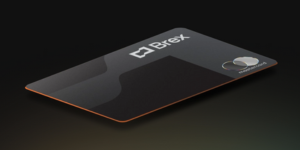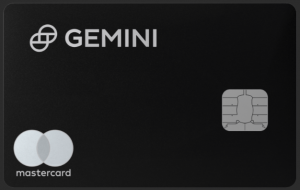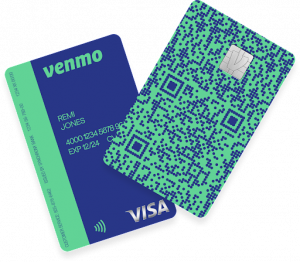
Crypto credit cards (sometimes called bitcoin credit cards) are the next generation of credit cards. They look like a typical credit card and act like a typical credit card: you can generally use them anywhere Visa, Mastercard, or Amex are accepted.
(Don’t confuse crypto credit cards with crypto debit cards, which are more like a prepaid card. See our list of best crypto debit cards here.)
Typically crypto credit cards are issued by banks or financial institutions, who give you a credit line. Alternatively, you may have your credit limit linked to your cryptocurrency balance.
There are various benefits of crypto credit cards, including:
- Earning rewards in cryptocurrency (like cashback rewards, but in crypto)
- The ease of making purchases directly with crypto
- Withdrawing cash from an ATM without converting it back into fiat currency first
However, while these cards have benefits, smart investors must remember to spend responsibly, beware of tax obligations, and pay the balance off every month to avoid excessive interest fees.

Gemini Credit Card
Gemini is a cryptocurrency exchange offering their own crypto credit card, simply called the Gemini Crypto Credit Card.
Read our review
Upgrade Bitcoin Rewards Card
The Upgrade Bitcion Rewards Credit Card offer is a bitcoin credit card allowing you to earn rewards when purchasing.
Read our review
Brex Corporate Credit Card
The Brex Corporate Credit Card is a good choice for business owners.
Read our review
Venmo Credit Card
The card is a good choice for existing Venmo users and customers who are new to cryptocurrencies.
Read our reviewBitcoin Credit Cards Compared
We’ve rated and reviewed the best crypto credit cards on the market; read on for our top picks.
| Card | Fees | Crypto Supported | Crypto Rewards? | Availability |
| Gemini | No annual fee. No exchange fees to acquire your crypto rewards. APR: 17.74% – 29.74% variable APR. $10 or 3% for cash advances (whichever is greater). Standard variable APR for cash advances is 30.74%. Fees may result from selling or converting your crypto rewards. | Offers rewards in bitcoin, Ethereum and 50+ other cryptocurrencies (Full list). | Yes: 3% crypto rewards for dining (up to $6k annually then 1%), 2% for groceries, and 1% for other purchases | United States residents. Cardholders have full control over their rewards and can trade or hold their rewards. |
| Upgrade Bitcoin Rewards Card | APR: 14.99% – 29.99%. No annual fees. 1.5% fee for selling Bitcoins. | Bitcoin | Yes: 1.5% Bitcoin on purchases when the statement is paid. Up to 10% cashback with Upgrade Shopping powered by Dosh. | Upgrade Bitcoin Rewards Card is not currently available in Hawaii or North Carolina. |
| Brex Corporate Credit Card | APR-Variable, not disclosed on website, No annual fee | Bitcoin or Ethereum. Redeem earned points for BTC or ETH through partner TravelBank. | 7x on rideshare, 4x on Brex travel, 3x on restaurants, 2x on software 1x on remaining. | Available in all 50 states. Business accounts only for C-corps, S-corps, LLCs, or LLPs. |
| Venmo Credit Card | No annual fee. 3% fee to send money. | Convert your cashback to crypto- Bitcoin, Ethereum, Litecoin, Bitcoin Cash. | 3% on eligible top spend category, 2% cash back on secondary category, 1% on all other eligible purchases | Not available in Hawaii. |
 Gemini Crypto Credit Card
Gemini Crypto Credit Card
Gemini is a cryptocurrency exchange that also offers a crypto credit card.
The company lets you spend your digital currency anywhere in the world just as you would with any other credit or debit card. The exchange provides over 50 types of cryptocurrencies, and deposits and account holders get their rewards immediately.
The card does not charge any extra fees for purchases or ATM withdrawals (although there are cash advance fees) and offers other features like 24/7 customer support and fraud protection.
Fees: No annual fees. 17.74% – 29.74% variable APR. $10 or 3% (whichever is greater) for cash advances. No ATM withdrawal fees.
Cryptos Supported: Offers rewards in bitcoin and 50+ other currencies. (Full List)
Rewards: 3% crypto rewards for dining (up to $6k annually, then 1%), 2% for groceries, and 1% for everyday purchases.
Availability: United States residents only. Cardholders can use the Gemini card anywhere in the world that accepts Mastercard.
Pros:
- Cryptocurrency awards converted in real-time.
- Cashback on dining, groceries, and other purchases.
- No annual or exchange fees.
- Change your crypto reward type at any time.
- Available to residents of all 50 states.
Cons:
- High cash advance fees
- Rewards are initially held in your Gemini exchange account creating an extra step for those who wish to self-custody.
Conclusion: The Gemini credit card is good for United States residents who dine out regularly, want to earn rewards in real-time and earn cashback for everyday spending. A huge plus is the ability to change your choice of crypto for receiving your rewards.
 Upgrade Bitcoin Rewards Card
Upgrade Bitcoin Rewards Card
Upgrade’s offering is a bitcoin credit card that allows you to earn bitcoin rewards when making purchases.
You can pay down your balance in equal monthly payments in return for a fixed interest fee, making it easier to budget.
Another advantage of the Visa card is the ability to use it to access a personal loan that gets paid directly to your account.
Once you’ve earned your bitcoin rewards, you can let the balance grow and the NYDIG platform stores your coins. When you sell the bitcoin, they’re then applied as statement credit.
Your bitcoin rewards are subject to a 90-day holding period.
Fees: None, except bitcoin fees of 1.5% when you sell.
Cryptos Supported: Bitcoin
Rewards: Unlimited 1.5% cashback. Other benefits include baggage insurance, purchase protection, and extended warranty coverage.
Availability: Not available in Hawaii and North Carolina.
Pros:
- Lower monthly payments and no annual fees.
- Flexibility. Users can spend their crypto at Visa accepting merchants or transfer funds to their bank account.
- Fixed rate monthly payments.
Cons:
- You can use the card to buy from retailers and ecommerce stores, but not for withdrawing cash from ATMs.
- 1.5% fee applies if you sell your bitcoin rewards.
- Bitcoin rewards are stored on the NYDIG platform with no choice to transfer them to your crypto wallet.
- You won’t receive rewards until purchases on the card are paid off.
Conclusion: The Upgrade Bitcoin Rewards Card serves as a good introduction to cryptocurrencies. However, because BTC transfers are not supported it’s not the best choice for individuals who want to take custody of their own crypto.
 Brex Corporate Credit Card
Brex Corporate Credit Card
The Brex corporate credit card is a good choice for business owners.
Cardholders are offered exclusive rewards intended to have a positive impact on their businesses. Additionally, card holders can redeem their points for either bitcoin or Ethereum via Brex’s partner, TravelBank.
They also offer a Brex exclusive tier that offers cardholders the highest cashback multipliers available. It’s a good choice for business owners who want to streamline their spending and enjoy crypto rewards.
Fees: No annual fee.
Cryptos Supported: Bitcoin and Ethereum.
Rewards: Offers exclusive rewards meant to have business impact using points to buy billboards, offsite and event planning, executive coaching services, and mental health sessions with Spring Health.
Availability: Available in all 50 states. Business must be located in the U.S. and must be a C-corp, S-corp, LLCs, or LLP.
Pros:
- Available to residents of all 50 states.
- Rewards optimized for business owners such as executive coaching services.
- Additional discounts available for multiple business services.
Cons:
- Rewards are only offered in bitcoin and Ethereum.
- Card is for business owners.
Conclusion: The Brex Corporate Credit Card is a good option for business owners who want to enjoy crypto rewards. The additional discounts on business services are an added bonus.
 Venmo Credit Card
Venmo Credit Card
Venmo is a mobile payment service that was founded in 2009. In 2021 they added functionality for users to buy and sell cryptocurrencies. Now, they offer a credit card that allows users to convert cashback incentives to crypto.
The card is a good choice for existing Venmo users. It also offers newcomers a light introduction to cryptocurrencies. Card holders can benefit from cashback in the form of crypto before deciding to make larger crypto purchases.
Fees: 3% fee to send money.
Cryptos Supported: Bitcoin, Ethereum, Litecoin, Bitcoin Cash
Rewards: 3% cash back on eligible top spend category, 2% cash back on secondary category, 1% on all other eligible purchases
Availability: Not available in Hawaii.
Pros:
- No transaction fee to purchase crypto with cash back rewards
Cons:
- Limited cryptocurrency options to receive rewards in.
- Must have a Venmo account in good standing and open for at least 30 days to qualify.
Conclusion: This card is a good fit for people who like the convenience of mobile payments but want to dabble in cryptocurrencies in a low-pressure way. It’s a no-brainer for those who already have a Venmo credit card.
Comparing Crypto Credit Cards
Here are our editorial picks for best crypto credit cards in each category.
Top Crypto Credit Card for Rewards
Winner: BlockFi Bitcoin Rewards credit card
With 3.5% in bitcoin for the first 90 days and regular special offers for new users, the BlockFi Bitcoin Rewards card stands out.
Ongoing, BlockFi also offers up to 2% in cash back. In addition, its Rewards Flex program allows cardholders to choose Ethereum, LiteCoin, Chainlink, PaxGold, basic Attention Tokens, Uniswap, or select from a range of stablecoins, if they prefer.
Top Crypto Credit Card for Crypto Support
Winner: Gemini
Gemini offers incredible flexibility with over 50 cryptocurrencies for users who want more than bitcoin or Ethereum.
Top Crypto Credit Card for Low Fees
Winner: Upgrade Bitcoin Rewards Card
The Upgrade Bitcoin Rewards Card has no annual, FX, or draw fees.
Best Crypto Credit Card Overall
Winner: Venmo Credit Card
Venmo has over 77 million mobile payment users. The Venmo Credit card is a sensible extension to serve existing users while allowing them to enjoy the added perk of cash back in the form of crypto rewards.
Tips on Using Bitcoin Credit Cards
At Bitcoin Market Journal, we’re all about helping you make smart financial decisions using crypto. This goes double with bitcoin credit cards, which come with their own set of cautions.
Read the Fine Print
Problem: Crypto cards have complicated fee structures and lack of consistency between cards. This is because the “bridge” between digital and traditional payment systems (e.g., VISA and crypto) is still being built.
In an ideal world: Do your homework. Some of these cards don’t have the same perks as traditional credit cards. They also have higher annual fees. As sexy as it sounds to earn bitcoin rewards, you may still be better off with a traditional credit card (once a year, you can still use your cash back rewards to buy bitcoin).
Make Sure It’s Really a Credit Card
Problem: Although many companies label their products as “crypto credit cards,” they don’t work the same way as traditional credit cards. Many are really crypto debit cards, where you’re taking funding from the crypto in your account rather than establishing a credit line.
In an ideal world: Credit card companies should be clear about what is a “crypto credit card” and a “crypto debit card,” and educate investors on the pros and cons of each (as we’re doing here).
Be Sure It’s Available in Your Country
Problem: Because this industry is new, most cards are only available in certain jurisdictions, and all cards have conversion fees if you want to use them internationally. These international fees can be confusing; sometimes it’s cheaper to just pay cash.
In an ideal world: Bitcoin credit card apps and websites should auto-detect your country and just give you clear language on where it can be used and the fees to use it internationally.
Beware of Processing Delays
Problem: Consumers are used to credit cards making instant transactions, but crypto doesn’t work that way. A single crypto transaction can vary from a few minutes to over an hour, or even a few days.
In an ideal world: Bitcoin credit card apps should include clear communication on the transfer process and a constantly-updated “tracking number” (like FedEx tracking) that shows what’s happening.
Beware of Volatility and Fees
Problem: If you’re holding your native assets in crypto, understand that it can swing wildly in price from day to day. (As mentioned above, some “bitcoin credit card” providers convert you into a native token, which means now you have volatility and a different token.)
In an ideal world: Bitcoin credit cards should have an easy three-swipe “tutorial” that walks you through how digital assets work, clarifying how your holdings may change over time.
Why Use Bitcoin Credit Cards?
For most investors, the best deal is a credit card that allows you to pay off your monthly balance in dollars, while giving you cashback rewards denominated in bitcoin.
In this way, you get the best of both worlds: it behaves like a regular credit card, but with the added bonus of earning crypto, which has delivered eye-popping returns over the last three years.
What is a crypto credit card?
A crypto credit card allows the owner to spend their cryptocurrency on real-world items without converting it back to fiat currency. What makes crypto credit cards most appealing to cardholders can also earn cryptocurrency rewards as cashback when they shop.
Like a regular card, crypto credit cards are subject to interest if you don’t pay your balance monthly and impact your credit record.
Annual fees, monthly fees, and charges for ATM withdrawals may also apply.
Pros and Cons of Bitcoin Credit Cards
| Pros | Cons |
| You can use them worldwide in outlets that accept Visa and Mastercard. However, depending on the card type, some geographical restrictions may apply | Some have limited options for spending your coins. |
| Risk-free access for cardholders new to crypto. | High conversion fees are associated with some cards. |
| Ability to hold both Fiat and cryptocurrencies. | Geographical limitations may apply. |
| Crypto cashback rewards and flexible spending. | The volatility of cryptocurrencies means any cashback may lose its value. |
Crypto credit cards vs. crypto debit cards
Crypto credit cards are sometimes used as a blanket term when discussing crypto debit cards, but there’s a significant difference between the two.
A crypto debit card allows you to purchase items the same way you would with any other debit card. These cards work in two ways: Prepaid, where you add crypto to your card, which then gets converted into fiat currency for spending, or linked to your crypto wallet, and your cryptocurrencies are converted to fiat when you spend them.
You can use crypto debit cards in-store or withdraw cash from an ATM.
However, whichever card type you have, you can only spend the funds in your account.
With crypto credit cards, you’re effectively being loaned funds from the card’s lender, which you’ll repay later. Any rewards are paid in cryptocurrency.
How to choose the best crypto credit card
A crypto credit card can be a great way to spend your cryptocurrency without converting it back into fiat. But with so many options out there, how do you choose the best one? Here are some key features to consider when choosing a crypto credit card:
Card Issuer
Generally, a crypto credit card is available from established crypto platforms like SoFi. That means setting up an account with your preferred provider or finding out what card options are available from any platforms you’re already signed up for.
If you’re new to crypto rewards, research what’s available, and compare and contrast the cards based on your needs.
Reward rate
Your reward rate is how much you’ll get in cashback for each purchase, and these vary from card to card. Sometimes the reward rate may be conditional. For example, with some cards, you must have a qualifying account to earn the highest level of cashback.
Reward rates may come in as a flat or bonus rate when you purchase from a specific niche, while some cards only pay cashback in certain categories.
Fees
As with any other card, charges may apply to your crypto credit card. These may include:
- Monthly fees: Not all cards charge a monthly fee, but it’s something to be aware of.
- Foreign transaction fee: For card withdrawals outside of the US. These can range from 3% to 5%.
- ATM withdrawal fees: These can vary from $2.50 to $3, sometimes more.
- Annual fees: A fee charged once a year for the privilege of having a credit account.
Investor Takeaway
If you use credit cards already, and you’re a crypto adopter, then there’s little reason not to consider one of the crypto credit cards highlighted. They have fees and rewards that are similar to any other Visa or Mastercard in your wallet, but rather than receiving your cashback rewards in fiat currency, you can receive it in bitcoin, Ethereum, or several other cryptocurrencies. This makes for an exceedingly easy and automated way to stack those sats.
FAQs
What is the difference between a crypto rewards credit card and a crypto rewards debit card?
A: Crypto credit cards allow you to earn rewards in crypto when you make purchases. Crypto debit cards, on the other hand, allow you to make purchases with your selected cryptocurrency.
What is the best crypto rewards card?
A: The BlockFi Bitcoin Rewards credit card is the best crypto rewards credit card overall, as it offers 2% cashback, 3.5% bitcoin in the first 90 days, and various reward programs.
Are crypto credit cards safe?
A: Crypto credit cards are generally safe to use. However, just like any other debit or credit card, they can be susceptible to fraud and theft. Before signing up for a crypto credit card, research how the company cares for its customers’ funds and what protections it has in place against fraud. Look for companies that are transparent, have third-party insurance, and emphasize security.
How do crypto credit cards work?
A: Crypto credit cards function much like regular credit cards. When you open a crypto credit card, you’ll receive a line of credit that can be used to make purchases online or in stores. However, instead of receiving rewards in cash back, you’ll receive rewards in cryptocurrency.
What are the benefits of using a crypto credit card?
A: Crypto credit cards allow you to earn rewards in crypto, easily make purchases with crypto, and withdraw cash from ATMs without needing to convert into fiat currency first.
Are there any risks associated with crypto credit cards?
A: Like normal credit cards, crypto credit cards are also susceptible to fraud and theft. Additionally, because crypto is a volatile asset, the value of your rewards can fluctuate from day to day, more so than if the rewards were in fiat.
Are crypto credit card rewards taxable?
A: No, crypto credit card rewards are not taxable if you spend money to earn them. When you acquire awards through purchases, these awards are classified as bonuses or rebates, not taxable income. However, any awards you earn that aren’t through spending could be considered taxable income. For example, if you receive a $100 gift card just for opening an account, that $100 would be considered taxable income. Because crypto tax law is complicated and evolving, we recommend working with a certified public accountant to ensure you’ve reported everything correctly.
What credit score do I need for a crypto credit card?
A: Typically, crypto credit cards are only available to consumers with excellent credit. You’ll usually need a credit score of 670 or higher to qualify for a crypto credit card.
For more crypto tips, don’t forget to sign up for our free blockchain investing newsletter.

